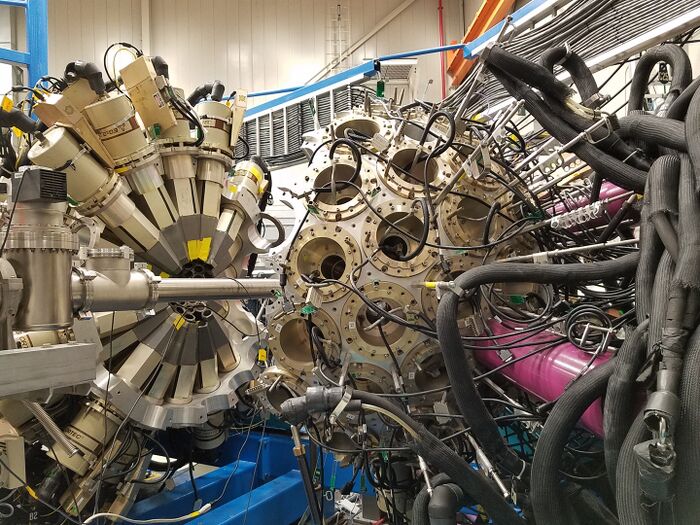Gammasphere: Difference between revisions
| Line 12: | Line 12: | ||
Each detector goes through data collection as a part of a larger data acquisition system ([[DAQ system]]). Attached to every Ge detector is a [[The Slope Box|slope box]] and [[The Slope Box Extension|SBX]]. They take data from a [[Preamplifier|preamplifier]] inside each detector and prepare to send it off to the greater [[DAQ system]]. | Each detector goes through data collection as a part of a larger data acquisition system ([[DAQ system]]). Attached to every Ge detector is a [[The Slope Box|slope box]] and [[The Slope Box Extension|SBX]]. They take data from a [[Preamplifier|preamplifier]] inside each detector and prepare to send it off to the greater [[DAQ system]]. | ||
* [[Gammasphere Detectors| | * [[Gammasphere Detectors|'''Detectors''']] | ||
* | * [[The Slope Box|Slope Box]] | ||
* [[The Slope Box Extension|SBX]] | * [[The Slope Box Extension|SBX]] | ||
Revision as of 18:11, February 14, 2023
Gammasphere is the world's most powerful spectrometer for nuclear structure research. Built in the early 1990s, it centers around unique experiments involving nuclear physics. It is particularly tailored to collect gamma ray data following heavy-ion fusion. Beams of ions are directed at a target (usually a thin metal film). Nuclei from the beam fuse with those in the target, producing highly excited, much heavier nuclei. Gammasphere detects gamma rays — high-energy light particles — emitted from the excited nuclei as they spin and cool. This is done with 110 High Purity Germanium (HPGe) detectors. Each germanium detector is surrounded by bismuth germanium oxide (BGO), which allows for the suppression of background resulting from gamma-rays whose energies are not completely absorbed by the germanium detector. The data is collected using hardware on Gammasphere and on each detector.
Hardware
Each detector goes through data collection as a part of a larger data acquisition system (DAQ system). Attached to every Ge detector is a slope box and SBX. They take data from a preamplifier inside each detector and prepare to send it off to the greater DAQ system.
Researcher Data Acquisition
Whenever research is being conducted with Gammasphere, data is collected and controlled by the researcher using the EPICS interface. EPICS is an acronym for “Experimental Physics and Instrumentation Control System”. It refers to software that provides a common network framework for computers to collectively manage a distributed database of control and monitoring values and for user interface software on a Linux box to provide a graphical user interface to those control and monitoring values. The discrete control and monitoring values in EPICS are called Process Variables, usually abbreviated as PV. A “PV” is one discrete value for control or monitoring that can be a numerical value, a bit-field with discrete selections or just a single bit. The graphical user interface program EPICS uses is called EDM, for “Extensible Display Manager”. EDM allows EPICS to represent PVs as visual controls – text boxes for values, drop-down selections for bit-fields, check boxes or buttons for single bits.
